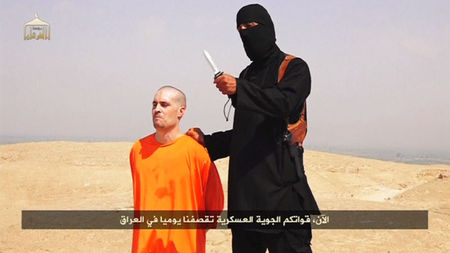By William James and Kate Holton
LONDON (Reuters) - British authorities launched a hunt on Wednesday for a man with an English accent who appeared in an Islamic State (IS) video purporting to show what Prime Minister David Cameron called the "barbaric and brutal" beheading of an American journalist.
A masked IS jihadist, dressed in black, who stood next to a kneeling James Foley in the video released online spoke with what sounded like a London accent.
The case had echoes of the brutal 2013 murder of British soldier Lee Rigby, who was hacked to death in a London street in broad daylight by two British Muslim converts, and of beheadings staged in the early years of the U.S. and British occupation of Iraq a decade ago.
It also renewed the focus on the number of young Britons willing to fight in Syria and Iraq.
"If confirmed, this brutal murder shows the broader danger of British citizens going out to Syria, where they can be drawn into extremist groups and get involved in what can only be described as barbaric acts," said a British security source, who spoke on condition of anonymity.
Cameron, who interrupted his holiday to return to London, said he was shocked that it appeared a British citizen had been behind the killing.
"Let me condemn completely the barbaric and brutal act that has taken place," he told broadcasters. "It is an act of murder."
Britain, which has about 2.7 million Muslims in its 63 million population, has warned of the dangers from its nationals travelling to foreign militant training camps after four young British Islamists killed 52 people in suicide bomb attacks on London in July 2005.
Two of the four had been to al Qaeda camps in Pakistan. In February this year, Islamist fighters released a video of what they said was a British man carrying out a suicide bombing on a prison in Aleppo, and several young British nationals have reportedly been killed overseas in fighting this year.
NARROW DOWN THE SEARCH
Security experts told Reuters that officials would be able to narrow down their search for the man through the few facts they already have, including his voice, height and eyes.
They will also search through travel records, social media entries and intelligence contacts within British communities to identify him.
"If you think back to 10 years ago, we were going through similar situations when there were previous victims, and it also isn't new to see British nationals there," said a former senior counter-terrorism official.
"We will build on the work done in the last 10 to 15 years," he added.
Bob Ayers, a former U.S. intelligence officer now living in Britain, said officers would conduct an acoustic and visual analysis of the tape to try and find more information about the location of the beheading, and to search for a voice match with other recordings. And though the militant's face was masked, his eyes were visible, which he said could permit an analysis of the eyes to rule out other people and so narrow down the possibilities for identification.
Nigel Inkster, a director at the International Institute for Strategic Studies, with 31 years of experience working at Britain's MI6 foreign intelligence service, said the hunt could take time.
He told Reuters the world was not like the TV dramas of "24" or "Spooks" where "one piece of information inexorably leads to the next". He also noted that IS was proving a huge draw to young Islamists intent on fighting.
Governments estimate that several thousand Europeans have gone to Syria since the war against President Bashar al-Assad started over three years ago. Britain estimates that some 500 of its nationals have travelled to fight, with around half coming from the capital.
Foreign Secretary Philip Hammond said British intelligence services would work closely with the United States to try to identify the man in the video and that a specialist counter-terrorism police unit had launched an investigation.
Security experts said a Briton may have been chosen to appear on the video because an English speaker would be accessible for showing on U.S television networks, and might increase the appeal to other Islamists considering travelling to the region.
It also acts as a reminder of the threat posed by such militants if they return home.
"Those who do become terrorists, when they return home become better terrorists because of the experience they have and the networks they develop," said Peter Neumann, director of the International Centre for the Study of Radicalisation at King's College, London.
Cameron has been insistent that Britain will not send any troops to fight in Iraq despite the escalating crisis, wary of alienating voters just eight months before a general election.
He is still smarting after his plan to join a potential military strike on Syria last year failed to get parliamentary backing and is well aware of the public opposition to Britain's role in joining the United States in 2003 to invade Iraq and topple Saddam Hussein.

Britain has instead sent "UK military assets" to the region to help with humanitarian efforts.
(Additional reporting by Guy Faulconbridge, Costas Pitas and Kylie MacLellan; Writing by Kate Holton and Belinda Goldsmith; Editing by Stephen Addison and Will Waterman)
